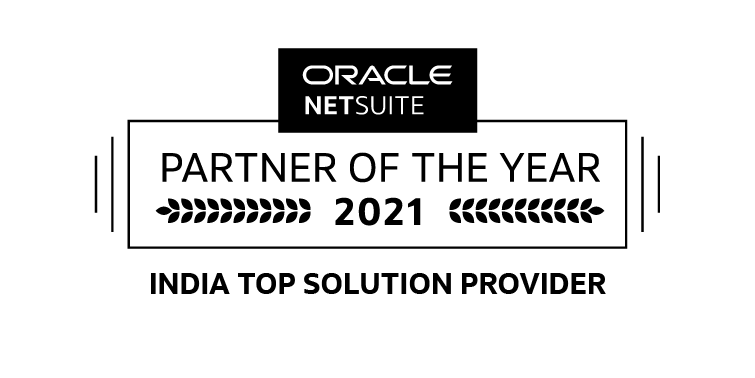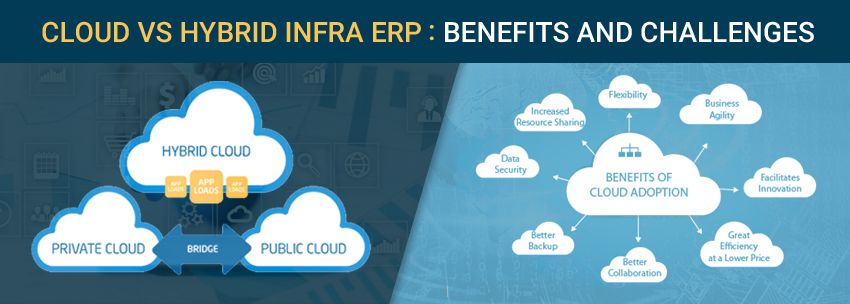In the course of picking up an Enterprise Resource Planning (ERP) solution, businesses are troubled the most by the decision whether to deploy it on-premise or in the cloud to steer transformation. Advancing with the technology, a Cloud-based ERP solution has digitally transformed numerous businesses and helped drive efficiency into its processes as well. However, limited information on the functionalities of both these solutions often leads to difficulty decision-making with the deployment of an efficient ERP solution.
Here, you can evaluate a move to the cloud and comprehend better to choose the right solution for a substantial buildout.
What is Cloud ERP?
It is a subscription-based service, which businesses have to pay to use the system. It renders remote accessibility through any device or gadget connected to the internet. It facilitates data storage in the cloud and hosted on the third-party server. Also, its subscription terms may vary with the functionality.
What is Hybrid Infra ERP?
The Hybrid ERP system stands for the realistic and contemporary idea of combining cloud-based ERP with an On-Premise ERP solution. With this system, business organizations can continue operating critical business applications and control applications with technical limitations efficiently. Interestingly, administrators can do it on their data centers or in a private cloud framework.
Benefits Of Hybrid Infra ERP
Thissystem is often considered a blend of conventional and agile IT. With the deployment of a Hybrid ERP system, businesses can go for the mid-way lying between the quickest implementation, lowest cost, and time-consuming implementation and superfluous. This is one of the key benefits of this solution as it helps avoid profligacy while transforming the business and driving innovation into the operations.
Enhanced organizational agility is another utility rendered by this system. Business organizations can witness fewer outages and disruptionsby leveraging the public cloud in heavy usage. Also, it attracts attention from global businesses by rendering options for developing and testing new applications before hosting.
Hybrid Infra ERP solution can be advantageous for certain industry sectors, including media, professional services, and business services as it assists the administrators to focus on assets and drive productivity. With this system, these businesses can gain maximum profitability in less training costs.
With its services distributed across multifarious data centers, the solution holds reliability And renders increased visibility into every operation within the system.
Benefits Of Cloud ERP
Low IT Costs—Cloud ERP solution delivers almost all the functionalities of an On-Premise ERP but helps avoid the superfluous outlay on the maintenance and update of expensive hardware. However, an upgrade is required to retain its affordability in the long run.
Security—It has been a misconception that Cloud ERP solutions are comparatively less secure than On-Premise solutions. Service providers have made great efforts to ensure security and privacy at the enterprise-level. Also, they have gone to great lengths to assure compliance with the system of the organization. Rendering mobility, it enables businesses to set security measures on a single device and make it applicable to other connected devices with consistency.
Scalability—With this functionality, enterprises can add and expand business processes with flexibility and gear transformation in new directions as well. In general, it assistsin the complete evolution of the business with efficiency.
Performance—This ERP solution is a convenient and intuitive way to streamline organizational operations and prioritize collaboration between the users. This accelerates business performance and drives productivity as well.
Accessibility—One-on-One interaction with the customers is one of the key essentials for numerous businesses to grow potential leads and maintain robust customer relationships as well.Cloud ERP solution enables all the employees to log into the system and access data from any remote location.
Predictability—Rendering accessibility to business applications from any device and from anywhere, Cloud ERP solution reduces redundant processes and assist in increasingoperational consistency.
Innovation—It facilitates its users with the management of system updates to take advantage without procrastination. This ERP solution enables business organizations to optimize the latest innovations to steer digital transformation and boost operational efficacy.
Adoption—Cloud ERP solution facilitates user adoption, which prompts real return on investment in ERP. Rather than just setting up and maintaining the system, it assists in focusing on user adoption to increase profitability.
Major Challenges With On-Premise and Cloud ERP Solutions
| Hybrid Infra ERP Solution | Cloud ERP Solution |
|---|---|
| It offers less security over data control. In particular, following theregulatory requirementsto prohibit off-site data storage and prevent the use of a public cloud is another major challenge with this system. | Although it is easier to deploy a pre-configured Cloud ERP solution than On-Premise, fewer customization options with its deployment forces operators to use the system in its original form. |
| Data and application integration is one of the major challenges with hybrid ERP solution. It may require the additional capability of copy data virtualization in case the application lives on a cloud and data in an on-premise data center. In such a case, it prompts decoupling the data from infrastructure. | Third-party hosting curtails the transparency business organization can get with in-house data storage and hosting. Although reputed service providers render reliability with a cloud ERP solution, businesses need to apprehend through multiple touchpoints before placing the trust. |
| As compared to a public cloud, building a private cloud may lead to a superfluous outlay and turns expensive with all the necessary physical hardware. Also, using public cloud resources heavily can raise usage bills eventually. | As this ERP solution has its functionality depending on the internet, poor connection or outage can prevent the users from using it. Although it renders mobility and can be accessed from anywhere, such disruptions drop-down overall productivity. |
On a conclusive note, moving to a cloud-based ERP solution can help execute industry-specific operations smoothly and drive digital transformation to the business as well. Big Data Visibility, reduced interruptions, omnichannel services steer rapid escalation in the organizational growth, productivity and help standardize all the processes efficiently.








